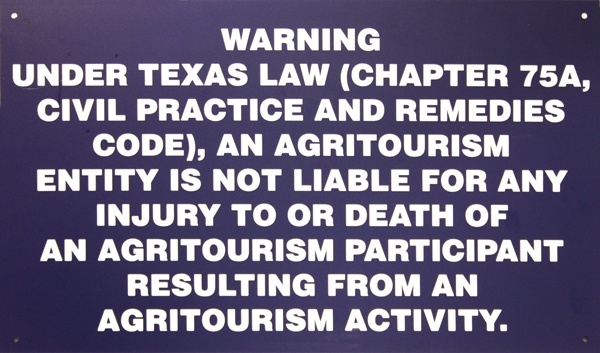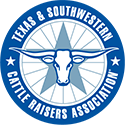
The Texas Agritourism Act, which went into effect in 2015, limits the liability of a landowner or agritourism entity if a visitor or guest is injured on their property while engaged in activities such as hunting, recreation or education, as long as the required sign is posted before the event. A signed waiver may take the place of a sign, as long as the participant has signed before the activity and the required language is included.
The sign must be posted in a clearly visible location on or near any premises on which an agritourism activity is conducted. This phrase, in whole, is as follows:
UNDER TEXAS LAW (CHAPTER 75A, CIVIL PRACTICE AND REMEDIES CODE), AN AGRITOURISM ENTITY IS NOT LIABLE FOR ANY INJURY TO OR DEATH OF AN AGRITOURISM PARTICIPANT RESULTING FROM AN AGRITOURISM ACTIVITY.
“Agricultural land” means Texas land that is suitable for use in production of plants and fruits grown for human or animal consumption, or plants grown for the production of fibers, floriculture, viticulture, horticulture or planting seed. It also means land suitable for domestic or native farm or ranch animals kept for use or profit.
Under the law, an agritourism participant injury means an injury sustained by an agritourism participant, including bodily injury, emotional distress, death, property damage or any other loss arising from the person’s participation in an agritourism activity.
The Agritourism Act is not intended to take the place of liability insurance or excuse a landowner from disregarding the safety of participants. It also doesn’t excuse negligence or improper training of the landowner’s employees.
According to the language of the act, landowners are still liable for injury due to the agritourism entity’s negligence evidencing a disregard for any the following dangers, of which the landowner had actual knowledge or reasonably should have known: a dangerous condition on the land, facilities, or equipment used in the activity; or the dangerous propensity, that is not disclosed to the agritourism participant, of a particular animal used in the activity.
It also does not absolve the landowner’s failure to train or for the improper training of an employee of the owner actively involved in an agritourism activity or intentionally caused by the owner.
Further questions about the Act should be directed toward your local TSCRA Special Ranger or trusted attorney familiar with landowner rights. Texas A&M AgriLife Extension Specialist and Assistant Professor Tiffany Dowell Lashmet also offers information and fact sheets on her Texas Agriculture Law Blog at agrilife.org/texasaglaw. Search the term “agritourism.” Lashmet was a speaker at the Cattle Raisers Convention in San Antonio, leading a workshop and talk on eminent domain.
To read the Act in its entirety, visit www.statutes.legis.state.tx.us/Docs/CP/htm/CP.75A.htm.
TSCRA offers 20×12 agritourism notice signs for ranchers and landowners to satisfy the posted warning requirement for Limited Liability for Agritourism Activities, as specified by Chapter 75A of the Texas Civil Practice and Remedies Code. They are plastic and match our blue POSTED signs in color and type.
To order, click here or call 800-242-7820. ❚
“Agritourism Act” is from the June 2017 issue of The Cattleman magazine.
